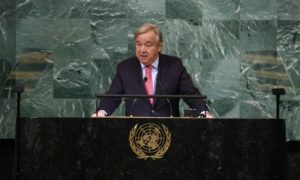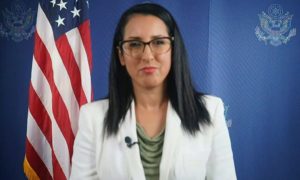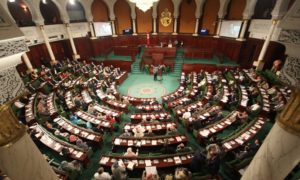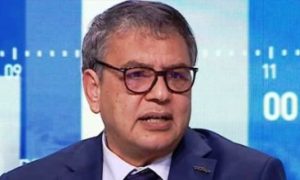South-South cooperation (SSC), born out of shared experiences and based on solidarity, positions developing countries to effectively mitigate and adapt to climate disruption, address global health emergencies and tackle other cross-cutting development goals. It is a collaborative endeavour among developing countries that aims to address common developmental challenges by sharing resources, best practices and expertise.
As we consider progress on the 2030 Agenda for Sustainable Development at the halfway point in its implementation, it is alarming to note that countries are on track with only 15 per cent of the targets. However, leveraging South-South cooperation can help significantly in bridging this gap. Developing countries increasingly leverage the United Nations system in support of South-South cooperation, including through contributing to the SSC trust funds managed by the United Nations Office for South-South Cooperation (UNOSSC), which have enabled over 70 countries to advance initiatives on sustainable development, working in partnership with over 20 United Nations agencies.
The challenges before us may seem insurmountable, but on this United Nations Day for South-South Cooperation (12 September), United Nations Secretary-General António Guterres reminds us that, “When nations unite, they can overcome obstacles and accelerate sustainable development.” By strengthening our solidarity and partnership with fellow developing nations, we can rise above adversity together.
Unlocking South-South potential
Countries of the Global South, working closely with Northern partners and the United Nations, can multiply and optimize their sustainable development successes by coordinating their efforts and benefiting from economies of scale.
It is our collective responsibility to build bridges and take urgent practical action to scale up South-South successes and lessons learned.
During these turbulent times, and especially as the COVID-19 pandemic laid bare societal inequities and exacerbated vulnerabilities, we were truly able to witness the power of South-South partnership. We were proud to take note of numerous examples of South-South cooperation in action: countries are providing medical aid or expertise to their neighbours, tapping into each other’s knowledge resources, establishing humanitarian and trade corridors, hosting refugees and sharing joint research, among other actions. Such solidarity reminds us of the power of South-South cooperation in overcoming even the most daunting obstacles across thematic areas.
Knowledge-sharing and capacity-building
Knowledge-sharing is central to South-South cooperation as it promotes an understanding of what works and what does not when facing common challenges. Through mutual exchange of expertise within the agriculture, science, technology, innovation or business sectors—just to name a few—developing nations can improve their capacity for innovation and problem-solving.
For example, the South-South Galaxy platform, managed by UNOSSC, presents an array of vetted South-South and triangular solutions. Currently, Galaxy boasts over 900 development solutions addressing a wide range of cross-cutting development challenges across all of the Sustainable Development Goals (SDGs) and multiple thematic areas. The platform is open to all stakeholders for sharing solutions and potential scaling up.
UNOSSC, working together with 30 United Nations entities, developed a United Nations System-Wide Strategy on South-South and Triangular Cooperation for Sustainable Development to promote a coordinated, coherent approach to United Nations programmatic work. UNOSSC is also rolling out a new set of guidelines for country- and regional-level work to anchor South-South and triangular cooperation in United Nations development planning instruments.

The South-South trust funds managed by UNOSSC are also fostering innovation and replicating success, including through demonstration projects for potential replication that are expanding digital financial inclusion through pro-poor climate insurance schemes, expanding health e-learning and enabling vulnerable communities to make digital payments for micro utilities.
Fostering economic partnership
Fostering economic partnerships will also create an interconnected network of trade relations that bolsters regional markets while supporting the development of global partnerships. The United Nations has facilitated the establishment of economic partnerships and regional trade agreements among developing countries, enhancing their economic resilience and self-reliance. For instance, the United Nations Conference on Trade and Development has actively supported regional trade blocs and facilitated trade capacity-building initiatives, enabling developing countries to tap into their economic potential and strengthen their international trade relations. These partnerships not only boost economic growth but also create opportunities for sharing economic strategies that prioritize sustainability and inclusivity.
The international community must find ways for stronger coordination on debt transparency and restructuring, especially for countries in debt distress.
What is needed is the mobilization of new and additional public resources to finance the SDGs. The United Nations Secretary-General has proposed an SDG Stimulus of $500 billion per year for this purpose.
We need to channel these resources to countries in special conditions and facing enormous challenges unique to those conditions, for example, the Landlocked Developing Countries (LLDCs). We have an opportunity to help shape the successor to the Vienna Programme of Action (VPoA, concluding in 2024) that leverages SSC to help LLDCs surmount obstacles related to their remote locations and distance from global markets. Increased investments for infrastructure development and technical support for building human and productive capacities will be crucial for LLDCs that are behind on many SDG targets.
Climate justice
One more urgent area in which the power of South-South cooperation must be harnessed is the quest for climate justice. Developing countries bear the brunt of climate change impacts. Through cooperative efforts, we can pool our resources and expertise to better adapt to the consequences of climate change and pursue sustainable energy alternatives.
The United Nations has played a critical role in promoting South-South cooperation dealing with climate change mitigation and adaptation. Through collaborative efforts, countries in the Global South are pooling their resources to develop and adopt technologies that mitigate the impacts of climate change and promote sustainable growth.
Honouring commitments to the proposed Loss and Damage Fund, the doubling of adaptation finance and the replenishment of the Green Climate Fund are essential.
Education and skills development
Finally, education and skills development are fundamental to achieving the SDGs. By collaborating on educational initiatives and sharing best practices in skills development, we can prepare generations for future challenges while ensuring social inclusion and progress. The United Nations has supported South-South cooperation in education by facilitating student exchanges, sharing educational resources and promoting training programmes. In Nicaragua, for example, the India-UN Development Partnership Fund and the United Nations Children’s Fund (UNICEF) are strengthening institutional capacities for the inclusion of children with disabilities in the educational system. The project has developed the first national master’s degree in inclusive education and improved infrastructure in 15 schools, which now serve as prototypes for scaling up. In Viet Nam, an IBSA Fund project administered by the World Health Organization is implementing an innovative e-learning approach in coastal and rural communities.
Efforts such as these are empowering developing countries to build skilled workforces and enhance human capital, laying the groundwork for sustainable economic progress.
Moving forward
As we celebrate the United Nations Day for South-South Cooperation and prepare for the SDG and Climate Ambition Summits (New York, 18–19 and 20 September 2023, respectively), the twenty-eighth Conference of the Parties to the United Nations Framework Convention on Climate Change (COP 28) (Dubai, United Arab Emirates, 30 November–12 December 2023), as well as other future events, it is essential that we recognize that our path towards the SDGs requires unity, understanding and partnership. South-South cooperation is essential in unlocking the potential of each nation taking part in this shared journey.
United Nations contributions to South-South cooperation have been instrumental in advancing the SDGs among developing countries. Through knowledge-sharing, capacity-building, economic partnerships, climate change mitigation and various other initiatives, the United Nations has fostered a spirit of collaboration and solidarity among nations in the Global South. As we move towards a more interconnected world, South-South cooperation remains an essential element in achieving sustainable development and fostering prosperity for all.
The continued commitment of the United Nations to supporting these efforts is crucial to building a more inclusive, equitable and sustainable future.
Source: UN Chronicle (Author:Dima Al-Khatib)
Link:South-South Cooperation Is Essential to Achieving the Sustainable Development Goals
What's happening in Tunisia?
Subscribe to our Youtube channel for updates.

















































